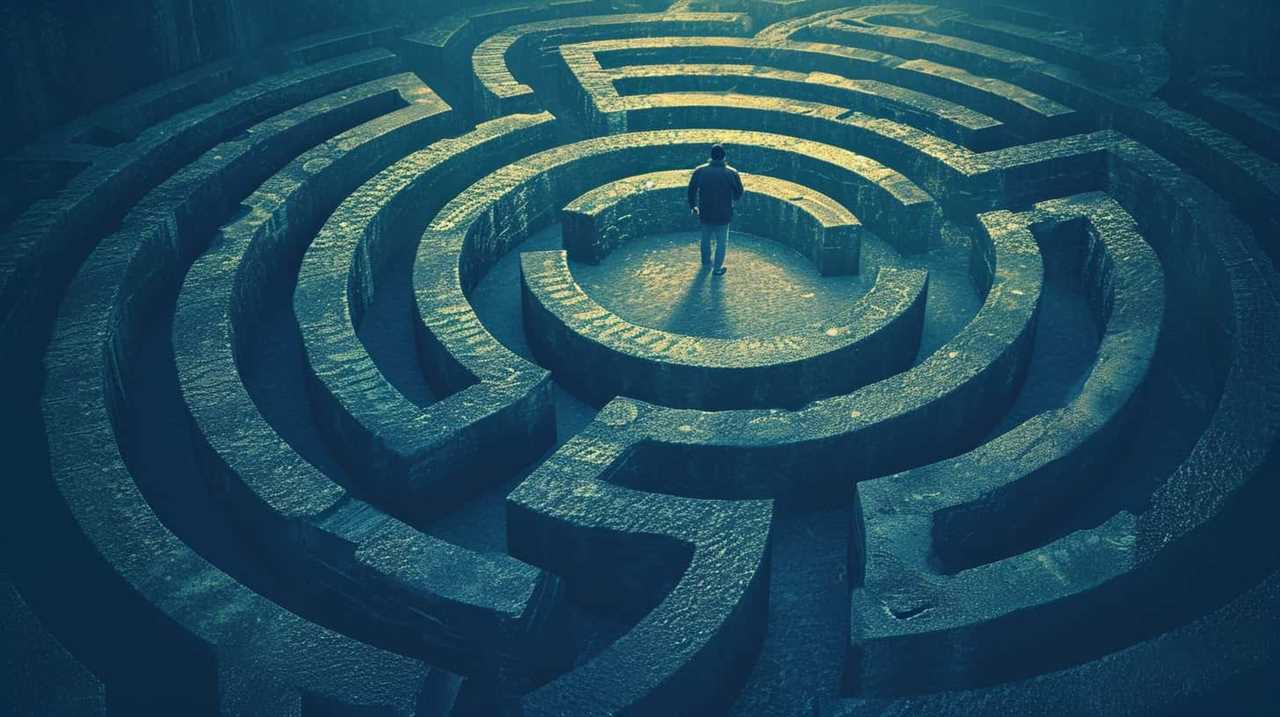We understand your thoughts: why should we bother deciphering the morality of villains? After all, they are seen as the epitome of evil, aren’t they?
But what if we told you that exploring the intricate depths of their twisted minds could lead us to a greater understanding of ourselves and the world we live in? In our quest for liberation, it is crucial to peel back the layers of villainy, to challenge conventional notions of right and wrong, and to examine the gray areas that exist within us all.
Through memorable film quotes, we will delve into the complexities of iconic villains like the Joker, the Bride, Hannibal Lecter, Anton Chigurh, and Marsellus Wallace, uncovering the underlying motivations and moral compasses that drive their actions.
So, join us as we embark on this enlightening journey into decoding villain morality.

Key Takeaways
- Villain characters like Joker, The Bride, Hannibal Lecter, Anton Chigurh, and Marsellus Wallace often challenge societal norms and have a chaotic moral compass.
- Their actions and beliefs often blur the lines between right and wrong, raising questions about the nature of justice and morality.
- These characters employ manipulation tactics, exploit vulnerabilities, and exercise power and control to achieve their goals.
- Their portrayal of ruthlessness, loyalty, pragmatism, a sense of justice, and vulnerability adds depth and complexity to their characters, making them both disturbing and fascinating to audiences.
The Dark Knight: Joker’s Chaotic Morality
The Dark Knight presents an intriguing exploration of the Joker’s chaotic morality through his memorable film quotes. The Joker’s nihilistic worldview is a stark contrast to the moral compass of the Batman. His belief that life has no inherent value and that chaos should reign supreme is evident in quotes like ‘Do I really look like a guy with a plan?’ and ‘I’m an agent of chaos.’ Through these quotes, the Joker reveals his disdain for order and his desire to disrupt society’s norms.
Furthermore, the Joker’s manipulation tactics are evident in his quote ‘You see, madness, as you know, is like gravity, all it takes is a little push.’ This quote demonstrates his ability to manipulate others into embracing chaos and embracing their inner darkness.
The Joker’s chaotic morality and manipulation tactics provide a thought-provoking exploration of the darker side of human nature.
Kill Bill: The Bride’s Quest for Justice
In our exploration of villain morality through memorable film quotes, we now turn our attention to Kill Bill and delve into The Bride’s unrelenting quest for justice.

The Bride’s journey towards redemption is a complex one, as she seeks to avenge the brutal attack on her wedding day and the murder of her unborn child. The ethical dilemma of revenge is at the forefront of her actions, as she grapples with the question of whether her pursuit of justice justifies the violent means she employs.
The film’s memorable quote, ‘Revenge is never a straight line. It’s a forest,’ encapsulates the moral ambiguity of her journey. As viewers, we’re forced to confront our own beliefs about justice and the consequences of our actions.
The Bride’s quest for justice challenges us to question the boundaries of morality and the price we’re willing to pay for it.
The Silence of the Lambs: Hannibal Lecter’s Twisted Code
As viewers, we’re intrigued by Hannibal Lecter’s twisted code and the chilling insight it provides into his morally complex character. Hannibal Lecter’s psychological manipulation is evident throughout the film, as he strategically uses his intelligence and knowledge of human behavior to control those around him. His ability to dissect the psyche of others and exploit their vulnerabilities is both disturbing and fascinating.

Through his twisted code, Lecter challenges our understanding of morality and forces us to question our own beliefs and values. The Silence of the Lambs also explores the theme of revenge, much like The Bride’s journey in Kill Bill. However, Lecter’s motivations are driven by a darker, more sinister desire for power and control.
His code is a testament to his cunning and manipulation, making him one of the most captivating and enigmatic villains in film history.
No Country for Old Men: Anton Chigurh’s Unwavering Principles
Anton Chigurh’s unwavering principles shape his chilling portrayal as a villain in ‘No Country for Old Men’. His enigmatic presence and the psychological depth of his character make him a formidable antagonist. Chigurh’s principles, although twisted and morally ambiguous, provide insight into his motivations and actions throughout the film.
| Chigurh’s Principles | Interpretation |
|---|---|
| Fate is predetermined | Chigurh believes that fate determines the outcome of every situation, and he sees himself as an agent of that predetermined fate. This belief justifies his cold-blooded killings and his relentless pursuit of his targets. |
| A strict code of honor | Chigurh follows a strict code of honor, even though it may seem perverse to others. He believes in holding people accountable for their actions, often forcing them to make life or death decisions based on chance. This code gives him a sense of control and power over others. |
| Embracing chaos | Chigurh thrives in chaotic situations, using them to his advantage. He sees chaos as an opportunity to exercise his power and dominance. His ability to remain calm and composed in the face of chaos adds to his enigmatic presence and makes him all the more terrifying. |
Chigurh’s unwavering principles, combined with his enigmatic presence and psychological depth, make him a villain that is both intriguing and terrifying. His character forces us to question our own principles and beliefs, leaving us unsettled long after the film ends.

Pulp Fiction: Marsellus Wallace’s Moral Compass
Continuing our exploration of villain morality, let’s delve into the intriguing character of Marsellus Wallace in Pulp Fiction and examine his moral compass. Marsellus Wallace is a complex character with a hidden agenda that adds depth to his villainy. Here are five key aspects that shed light on his moral compass:
- Ruthlessness: Marsellus isn’t afraid to resort to extreme measures to protect his interests.
- Loyalty: He values loyalty above all else, as seen in his fierce protection of his wife, Mia.
- Pragmatism: Marsellus makes calculated decisions based on what’ll benefit him the most.
- Sense of justice: While his methods may be questionable, Marsellus believes in meting out punishment to those who cross him.
- Vulnerability: Beneath his tough exterior, Marsellus is shown to have moments of vulnerability, adding complexity to his character.
Frequently Asked Questions
What Are Some Other Notable Films That Explore Villain Morality Through Memorable Quotes?
Exploring the psychology of villains through quotes allows us to understand their motivations. Analyzing the impact of memorable quotes on villain morality in film reveals how they shape our perception. It’s insightful, liberating, and thought-provoking.
How Do These Villains’ Moral Codes Compare to Those of Classic Literary Villains?
When comparing the moral codes of classic literary villains to those of film villains, we observe a stark contrast. The evolution of villain morality in modern cinema reveals a departure from traditional archetypes, allowing for more complex and relatable characters.
What Are Some Common Themes or Motifs That Emerge When Analyzing Villain Morality in Film?
Exploring the psychology of villainy and analyzing the moral ambiguity of antagonists, we uncover common themes and motifs in film. These insights liberate our understanding by revealing the intricate complexities of villain morality.

How Do These Memorable Quotes Contribute to the Overall Character Development of the Villains?
Memorable quotes play a vital role in shaping villainous characters by impacting our perception and understanding of their moral compass. Through powerful dialogue, these quotes contribute to the overall character development, allowing us to delve deeper into their psyche and motivations.
Are There Any Real-Life Examples or Historical References That Influenced the Creation of These Villain Characters?
Real life influences and historical references play a significant role in shaping the creation of villain characters. These external factors provide a rich source of inspiration, allowing filmmakers to explore complex moralities and add depth to their storytelling.
Can Action Movie Quotes Provide Insight into Villain Morality in Film?
Action movie quotes can offer a window into decoding morality in action movies. Villains often have compelling lines that reveal their twisted sense of right and wrong. By examining these quotes, we can gain insight into the complex morality of these antagonists and their motivations.
Conclusion
In exploring the moral complexities of iconic film villains, we gain a deeper understanding of the human psyche and the blurred lines between good and evil.
These memorable quotes serve as windows into their twisted moral codes, challenging our own beliefs and provoking introspection.

Through the lens of chaos, justice, manipulation, unwavering principles, and moral compasses, these villains leave an indelible mark on our minds and emotions.
They remind us that sometimes the most captivating characters are the ones who walk the line between darkness and light.
Lauren’s talent in writing is matched by her passion for storytelling. Her love for books and deep understanding of culture and entertainment add a distinct flavor to her work. As our media and press contact, Lauren skillfully bridges the gap between afterQuotes and the broader media landscape, bringing our message to a wider audience.










